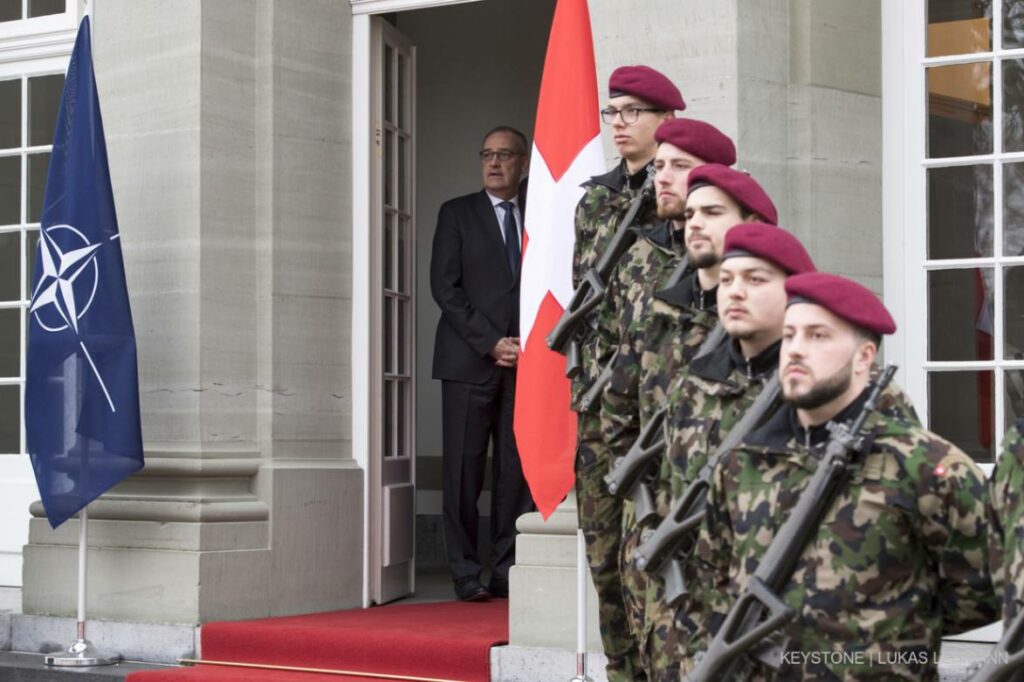Wed, Jan 31st 2024
Switzerland Explores Strengthened NATO Ties Within Neutrality Limits

The Federal Council wants to strengthen cooperation with the North Atlantic defense alliance NATO. For example, the deployment of members of the armed forces for training missions for third parties or the transit of foreign military personnel through Switzerland for training purposes are to be examined.
“A legal basis is to be created here while respecting the limits of neutrality law”, according to a report approved by the Federal Council on Wednesday, which was commissioned by Parliament. Based on the conclusions of the report, the Federal Council will examine whether and – if so – which measures should be further deepened or implemented.
The report sets out how deeper, institutionalized cooperation with NATO can be achieved while maintaining neutrality. “Switzerland has largely imposed the current restrictions on itself; it is therefore up to it to abandon or at least adapt them within the framework of the law of neutrality,” the Federal Council wrote.
It also stated in the report that no obligations, dependencies or constraints should be entered into that would be incompatible with neutrality. In times of peace, certain cooperative ventures could require a neutrality clause. “In this case, it would be up to Switzerland to decide whether to activate such a clause.”
Focus on interoperability
The Federal Council’s increased cooperation with NATO includes, for example, training services by militia units on training grounds in neighboring countries or in multilateral exercises. In addition, the deployment of individual militia members outside of conventional military peace support services for missions in multilateral staff structures or for training missions for third parties is being examined.
The clarifications also include military mobility, in particular the legal regulation for any transit of military formations from partner nations. Overall, interoperability is to be expanded. “This could prove vital in the extreme case of a military attack.”
The aim of interoperability is to ensure that the armed forces use the same terminology and apply the same military standards as NATO and, in particular, its neighboring countries. The Federal Council wrote that it is crucial for the further development of interoperability that the armed forces are involved in the elaboration and development of common standards with NATO.
A give and take
As a neutral state, Switzerland strives to defend itself independently, according to the Federal Council. In the event of an attack, however, it is free to organize its defence together with other states. The Partnership for Peace, as the current institutional framework for cooperation with NATO, would also make it possible to intensify cooperation in the area of defense in the future.
According to the Federal Council, cooperation should generally focus more strongly than before on aspects that are important for strengthening defense capabilities. Because cooperation is a give and take and requires the willingness of partners, Switzerland should make substantial contributions, for example by participating in multinational competence centers for armed forces and in military peacebuilding in conflict areas.
“In any case, Switzerland benefits from a strong NATO,” wrote the Federal Council. Switzerland is not in a position to defend itself against all potential threats on its own. In particular, the proliferation of ballistic missiles poses a threat that Switzerland cannot overcome on its own.
Costs of up to 100 million francs
In the supplementary report to the Security Policy Report of September 2022, the Federal Council had already stated that security and defense policy should be geared more consistently towards international cooperation, particularly with NATO, the EU and neighboring countries. In the latest report, he now writes that it is “essential that additional resources are made available to intensify multilateral cooperation and that the corresponding legal bases are developed”.
The Federal Council estimates the costs of closer cooperation at between CHF 15 and 100 million per year. The annual costs for the current cooperation amount to around CHF 4 million on average.
©Keystone/SDA
